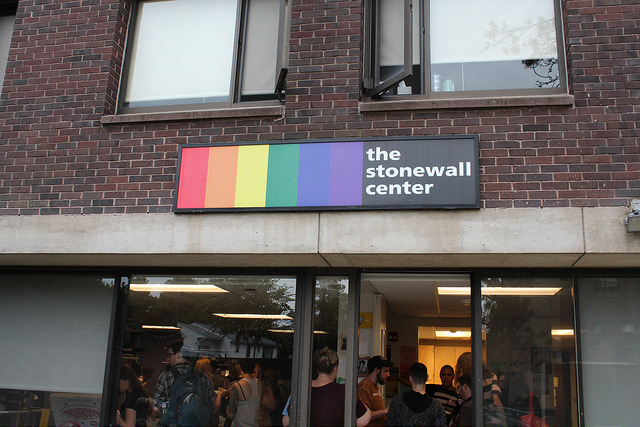The first day of the spring semester was marked by the grand opening of the fifth location of the Student Care Supply Closet in the Stonewall Center.
At Student Care Supply Closets, students fill out a shopping sheet and can pick up toiletry and household items from the newly opened Stonewall location, Dean of Students Office, Veterans Resource Center, Off-Campus Student Center or Center for Multicultural Advancement and Student Success.
“We really try and have a balance of offices that serve more vulnerable populations, financially especially,” said Elizabeth Hart, student care supply closet coordinator in the Dean of Students Office.
“Whenever the offices are open, that’s when we’re open. Unfortunately, it doesn’t mean we’ll always have the products to give, but we always give as many products as we can,” Hart added.
The new supply closet, located in Crampton Hall, is the first location in any residential area on campus.
Genny Beemyn, director of the Stonewall Center thinks “it’s really important to have a supply closet in Southwest because so many res[idential] hall students live there.”
Beemyn explained the partnership with this program came to be after a student who frequents the Stonewall Center and was familiar with the program suggested that a new location be added. The turnaround time was quick. After meeting with Dean of Students Cara Appel-Silbaugh in November with the idea, the closet was ready to open for the spring semester.
Like the other locations, students can stop by with an appointment during typical business hours.
“One difference from other supply closets is ours is actually located in a closet. It’s kind of funny, the Stonewall Center, where people are out of the closet and we do have closets,” Beemyn said.
The “Basic Needs Insecurity in Massachusetts Public Colleges and Universities” study conducted by the Wisconsin Hope Lab supports the program’s mission to help all University students, but focusing on vulnerable populations of students.
“In both the Massachusetts and national samples, students describing their gender as non-binary, homosexual students and bisexual students were more likely to experience insecurities of all types [food insecurity, housing insecurity and homelessness],” the report explains. “Non-binary students in the Massachusetts sample, however, reported substantially higher housing insecurity and homelessness relative to the national sample.”
“I think it’s a valuable service that we should be providing, not only for LGBTQIA+ students, but for all students to take advantage of,” Beemyn said.
Moving forward, there are currently no plans for the addition of new locations. Hart explained the closets are primarily donation-based and rely on donors. Occasionally, the Student Care & Emergency Response Fund is used to buy products when supplies are low and they are desperate to fill the closets.
“It’s hard because we don’t have too many donations, not as much as we’d want and so it’s hard to spread it all out evenly,” Hart said. “Our location and the off-campus student center are definitely the most popular locations students go to. So trying to arrange and distribute is really tough.”
The Dean of Student-run initiative was created last year. During fall 2017 and spring 2018, 113 users visited the closets. Of those people, 15 percent were out-of-state students, 23 percent were international students and 62 percent were in-state students. As of mid-December, the closets had 50 total visits from 42 individual users during the fall 2018 semester. Hart noted that many users came after that, especially to gear up for the winter break.
Since the winter season approached, users are asking for lotion, specifically unscented and for sensitive skin. Shampoo, paper towels, toilet paper and toothbrushes are what students need and request the most. The closets are also looking for feminine hygiene products like tampons and pads.
One of the most expensive products people come to closets looking for are diapers and other baby products. On the shopping sheet, users indicate if they have dependents. Hart said they have a lot of families of graduate students use the closet, so they try to cater toward them.
“We’re trying to put [the program] more out there and bring awareness because not only does bringing awareness encourage students to use it, but also it encourages donors to donate their items that they don’t use,” she said.
Since Hart started her graduate program in higher education administration and the position in the Deans Office this past October, she has been working to host more drives and create more partnerships with groups on campus.
The New Students Orientation office promoted the program and asked parents to bring supplies with them when students first moved-in in August. The big drive they hosted this year was alongside the student food pantry in Bartlett, who serves many of the same students. The Fine Arts Center also collaborated with the closet for a winter drive. Hart hopes to partner with Greek life, res-life and “any sort of office that works with vulnerable students and has a wide-audience.”
Hart is currently working with the Western Mass Food Bank and is arranging for a representative to come to campus and teach students how to sign up for Supplemental Nutrition Assistance Program, formerly known as food stamps.
“I hope that the stigma of using resources like this isn’t affecting people wanting to come here,” Hart said. “…We don’t want to be secretive about it because there shouldn’t be a stigma around it. If you need something, that’s okay.”
Abigail Charpentier can be reached at [email protected] and followed on Twitter @abigailcharp.




















